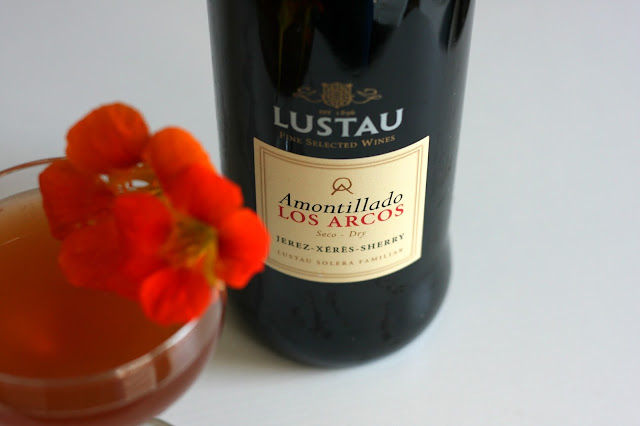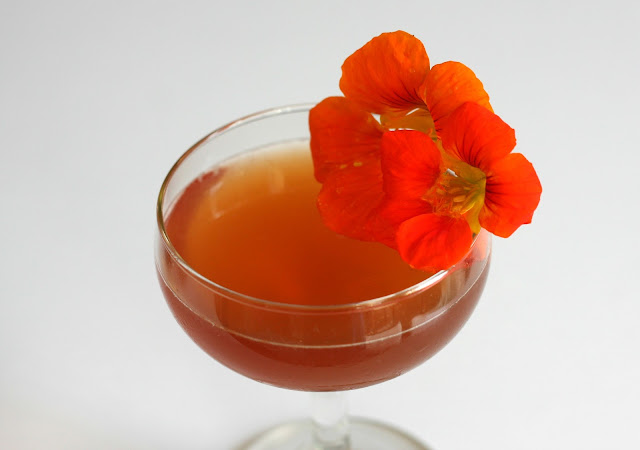A month or two ago, I finally bought the Death & Co cocktail book, a veritable bible of cocktail recipes and mixology tips from the famous New York bar. I'm still slowly working my way through the first half of the book, which is filled with information on spirits and techniques. I just finished the section on stirring cocktails, and it's so specific and complex that I'm a little afraid to move on to shaking!
In the section on cocktail ingredients, the book goes through all the major spirits and explains what bottles they use behind the bar and why. I was pleased to see that their choices are usually accessible and affordable, and I’m definitely going to try out some of their recommendations. When I got to the section on sherry, an ingredient I’ve never worked with before, I was shocked to read that a decent bottle of sherry could cost as little as $12. For $12, I could absolutely try some sherry. Especially after coming across the recipe for the Flor de Jerez, which sounded quite delicious.
In case you're a sherry novice like me, I’ll give you a quick primer to bring you up to speed, summarized from the Death & Co book. Sherry is a fortified wine made in Spain. There are a number of different varieties that are primarily characterized based on the way they are aged, which determines how sweet the final product will be. The driest sherries are fino and manzanilla, which are made using biological aging, a process during which a layer of yeast prevents the sherry from contacting the air after a certain point. The sweeter varieties of sherry, like oloroso, use an oxidative aging process like other wines and spirits, during which they are in constant contact with the air. And amontillado, the variety I ultimately chose, goes through a combination of these processes - first it undergoes biological aging, then oxidative. That makes it rich and sweet in aroma but actually fairly dry to taste.
I chose amontillado because I feel like I see it used in cocktails most often. My bottle of Lustau, the brand Death & Co recommends, was only $14. Like vermouth, sherry does go bad eventually, so it should be kept in the fridge and used within a few months (connoisseurs will say weeks, but I personally don't notice that much of a difference).
I chose amontillado because I feel like I see it used in cocktails most often. My bottle of Lustau, the brand Death & Co recommends, was only $14. Like vermouth, sherry does go bad eventually, so it should be kept in the fridge and used within a few months (connoisseurs will say weeks, but I personally don't notice that much of a difference).
As soon as I got home with my bottle of Amontillado, I mixed up the Flor de Jerez, and I was incredibly impressed. It's bright and aromatic, blending the deeper raisin flavors of the sherry with tart lemon and apricot. The sherry has a really distinct flavor that blends beautifully with the other ingredients. I'm excited to try it in some other cocktails.
The Flor de Jerez calls for an apricot liqueur, and Death & Co recommends Rothman & Winter. This is definitely on my wish list, but since I currently don't have a bottle, I used a bit of apricot preserves to try and achieve the same flavor. I'm quite happy with the result, and I've used this substitution in a few other cocktails since then.
History: This cocktail was invented by Joaquín Simó at Death & Co in 2009. He writes in the Death & Co book: "I was after a light-bodied cocktail that shone forth with fruit and nuts yet remained dry and refreshing." Mission accomplished.
Flor de Jerez
1/2 oz Jamaican-style rum (Appleton Estate Reserve recommended)1 1/2 oz. Amontillado sherry (Lustau recommended)
1 tsp. apricot preserves (substituted for 1/2 oz. apricot liqueur)
3/4 oz. lemon juice
1/2 oz. cane sugar syrup*
1 dash Angostura bitters
Combine all ingredients in a shaker with ice and shake until chilled. Strain into a coupe glass. No garnish recommended; I used a couple of nasurtium flowers.
*Death & Co's recipe for cane sugar syrup is a 2:1 mixture of cane sugar (sometimes called "evaporated cane juice") and water. If you can't get your hands on some cane sugar, Demerara or regular sugar make fine substitutes. But maybe don't tell the folks at Death & Co that I said so.
Recipe from Death & Co: Modern Classic Cocktails.








No comments:
Post a Comment